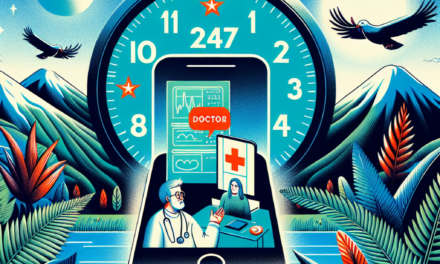HIMSSCast: The Powerful Synergy of Nurse Practitioners and AI
The healthcare landscape is undergoing a transformative shift, driven by technological advancements and the increasing demand for efficient patient care. Among the key players in this evolution are Nurse Practitioners (NPs) and Artificial Intelligence (AI). The HIMSSCast podcast has been instrumental in discussing the intersection of these two forces, highlighting how their synergy can enhance healthcare delivery. This article delves into the powerful collaboration between Nurse Practitioners and AI, exploring its implications, benefits, challenges, and future prospects.
The Role of Nurse Practitioners in Modern Healthcare
Nurse Practitioners are advanced practice registered nurses who provide a wide range of healthcare services. They are equipped with the training and authority to diagnose and treat medical conditions, prescribe medications, and manage patient care. The role of NPs has evolved significantly over the years, making them essential contributors to the healthcare system.
According to the American Association of Nurse Practitioners (AANP), there are over 325,000 licensed Nurse Practitioners in the United States, a number that continues to grow. This increase is largely due to the rising demand for healthcare services, particularly in primary care settings. NPs are often the first point of contact for patients, especially in underserved areas where access to physicians may be limited.
Some key responsibilities of Nurse Practitioners include:
- Conducting physical exams and health assessments
- Diagnosing and treating acute and chronic illnesses
- Ordering and interpreting diagnostic tests
- Providing patient education and counseling
- Collaborating with other healthcare professionals to ensure comprehensive care
The versatility of NPs allows them to work in various settings, including hospitals, clinics, and community health organizations. Their ability to provide high-quality care has been supported by numerous studies, which show that NPs deliver care that is comparable to that of physicians, often with higher patient satisfaction rates.
Understanding Artificial Intelligence in Healthcare
Artificial Intelligence refers to the simulation of human intelligence processes by machines, particularly computer systems. In healthcare, AI encompasses a range of technologies, including machine learning, natural language processing, and robotics. These technologies are designed to analyze complex medical data, assist in clinical decision-making, and improve patient outcomes.
The integration of AI in healthcare has gained momentum in recent years, driven by the need for more efficient and effective care delivery. According to a report by Accenture, AI applications in healthcare could save the industry up to $150 billion annually by 2026. This potential for cost savings, combined with improved patient outcomes, has led to increased investment in AI technologies.
Key applications of AI in healthcare include:
- Predictive analytics for patient risk assessment
- Natural language processing for clinical documentation
- Image recognition for diagnostic imaging
- Robotic process automation for administrative tasks
- Virtual health assistants for patient engagement
AI’s ability to process vast amounts of data quickly and accurately makes it a valuable tool for healthcare providers. By leveraging AI, Nurse Practitioners can enhance their clinical decision-making, streamline workflows, and ultimately improve patient care.
The Synergy Between Nurse Practitioners and AI
The collaboration between Nurse Practitioners and AI represents a powerful synergy that can transform healthcare delivery. By integrating AI technologies into their practice, NPs can enhance their capabilities, improve patient outcomes, and address the challenges posed by an increasingly complex healthcare environment.
One of the primary benefits of this synergy is the ability to leverage data for informed decision-making. AI can analyze patient data, identify trends, and provide NPs with actionable insights that enhance their clinical judgment. For example, AI algorithms can predict which patients are at higher risk for certain conditions, allowing NPs to intervene early and provide targeted care.
Additionally, AI can assist NPs in managing their workloads more efficiently. By automating routine tasks such as data entry and appointment scheduling, NPs can focus more on direct patient care. This not only improves job satisfaction but also enhances the overall patient experience.
Case studies have demonstrated the effectiveness of this collaboration. For instance, a study published in the Journal of the American Medical Association (JAMA) found that NPs using AI-driven clinical decision support systems were able to improve diagnostic accuracy and reduce unnecessary tests. This not only led to better patient outcomes but also resulted in significant cost savings for healthcare organizations.
Challenges and Considerations in Integrating AI with NP Practice
While the synergy between Nurse Practitioners and AI holds great promise, it is not without challenges. The integration of AI technologies into NP practice requires careful consideration of several factors, including training, ethical implications, and regulatory issues.
One of the primary challenges is the need for adequate training. Nurse Practitioners must be equipped with the skills to effectively utilize AI tools in their practice. This includes understanding how to interpret AI-generated data, as well as being aware of the limitations and potential biases inherent in these technologies. Ongoing education and training programs will be essential to ensure that NPs can harness the full potential of AI.
Ethical considerations also play a significant role in the integration of AI in healthcare. Issues such as data privacy, informed consent, and algorithmic bias must be addressed to ensure that AI technologies are used responsibly. Nurse Practitioners must advocate for ethical standards in AI development and implementation, ensuring that patient welfare remains the top priority.
Regulatory challenges are another important consideration. The rapid pace of technological advancement often outstrips existing regulations, leading to uncertainty about the legal implications of using AI in clinical practice. Policymakers must work collaboratively with healthcare professionals to establish clear guidelines that govern the use of AI in healthcare settings.
The Future of Nurse Practitioners and AI Collaboration
The future of healthcare is poised for significant transformation as Nurse Practitioners and AI continue to collaborate. As technology evolves, NPs will have access to increasingly sophisticated AI tools that can enhance their practice and improve patient care.
One potential area of growth is the use of AI in telehealth. The COVID-19 pandemic accelerated the adoption of telehealth services, and AI can play a crucial role in enhancing these virtual interactions. For example, AI-powered chatbots can assist NPs in triaging patients, providing immediate responses to common questions, and facilitating follow-up care.
Moreover, the integration of AI in predictive analytics will enable NPs to identify at-risk populations and implement preventive measures more effectively. By analyzing social determinants of health and other relevant data, AI can help NPs tailor interventions to meet the unique needs of their patients.
As the healthcare landscape continues to evolve, the collaboration between Nurse Practitioners and AI will be essential in addressing the challenges of an aging population, rising chronic disease prevalence, and increasing healthcare costs. By embracing this synergy, NPs can enhance their role as primary care providers and improve health outcomes for their patients.
Conclusion
The powerful synergy between Nurse Practitioners and Artificial Intelligence represents a transformative force in healthcare. As NPs continue to play a vital role in patient care, the integration of AI technologies can enhance their capabilities, streamline workflows, and improve patient outcomes. While challenges exist, including the need for training, ethical considerations, and regulatory issues, the potential benefits of this collaboration are immense.
As we look to the future, it is clear that the partnership between Nurse Practitioners and AI will be instrumental in shaping the next generation of healthcare delivery. By leveraging the strengths of both NPs and AI, we can create a more efficient, effective, and patient-centered healthcare system that meets the needs of diverse populations.
In summary, the HIMSSCast discussions on the synergy between Nurse Practitioners and AI highlight the importance of this collaboration in modern healthcare. As technology continues to advance, it is crucial for healthcare professionals to embrace these innovations and advocate for their responsible use to ensure the best possible outcomes for patients.





